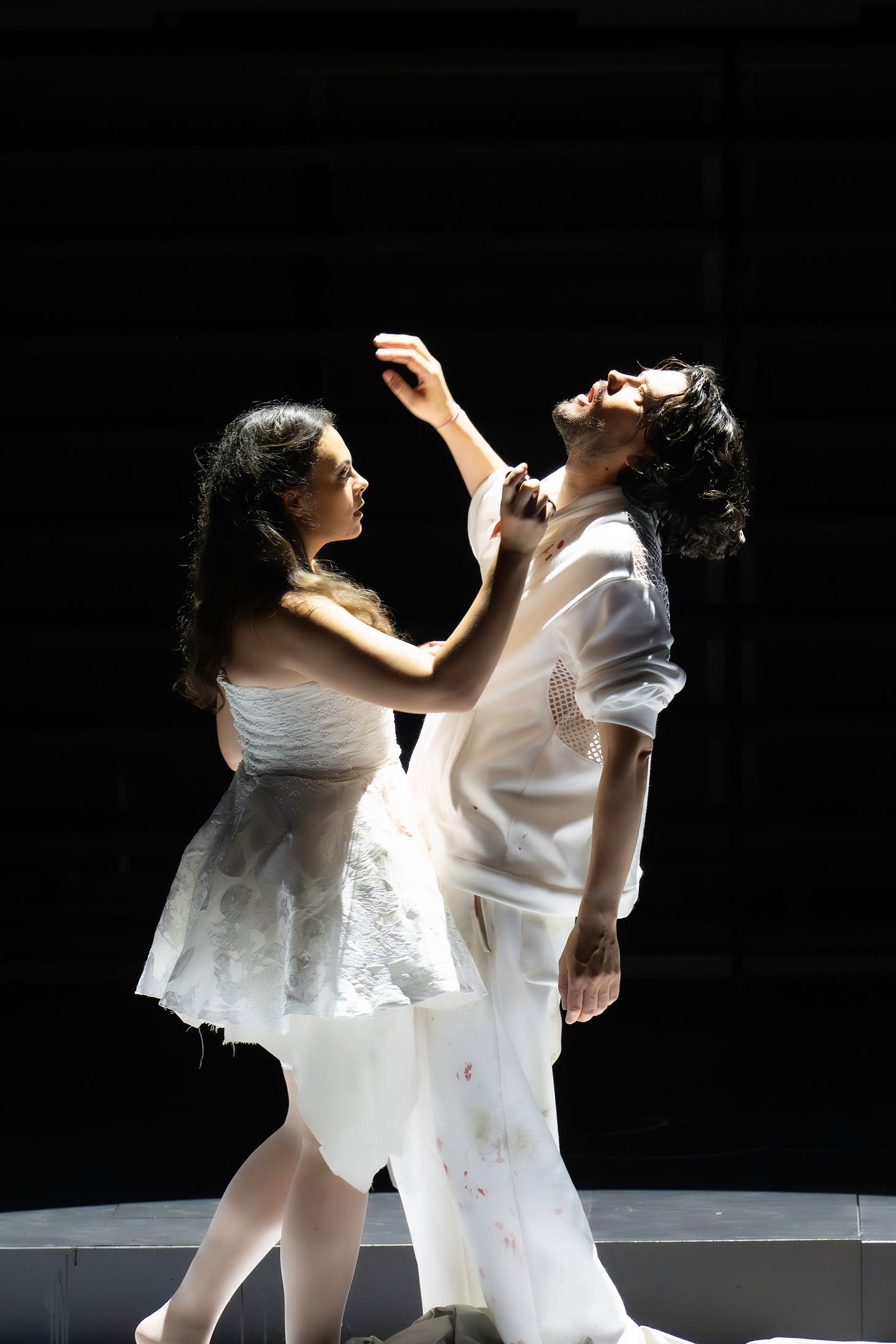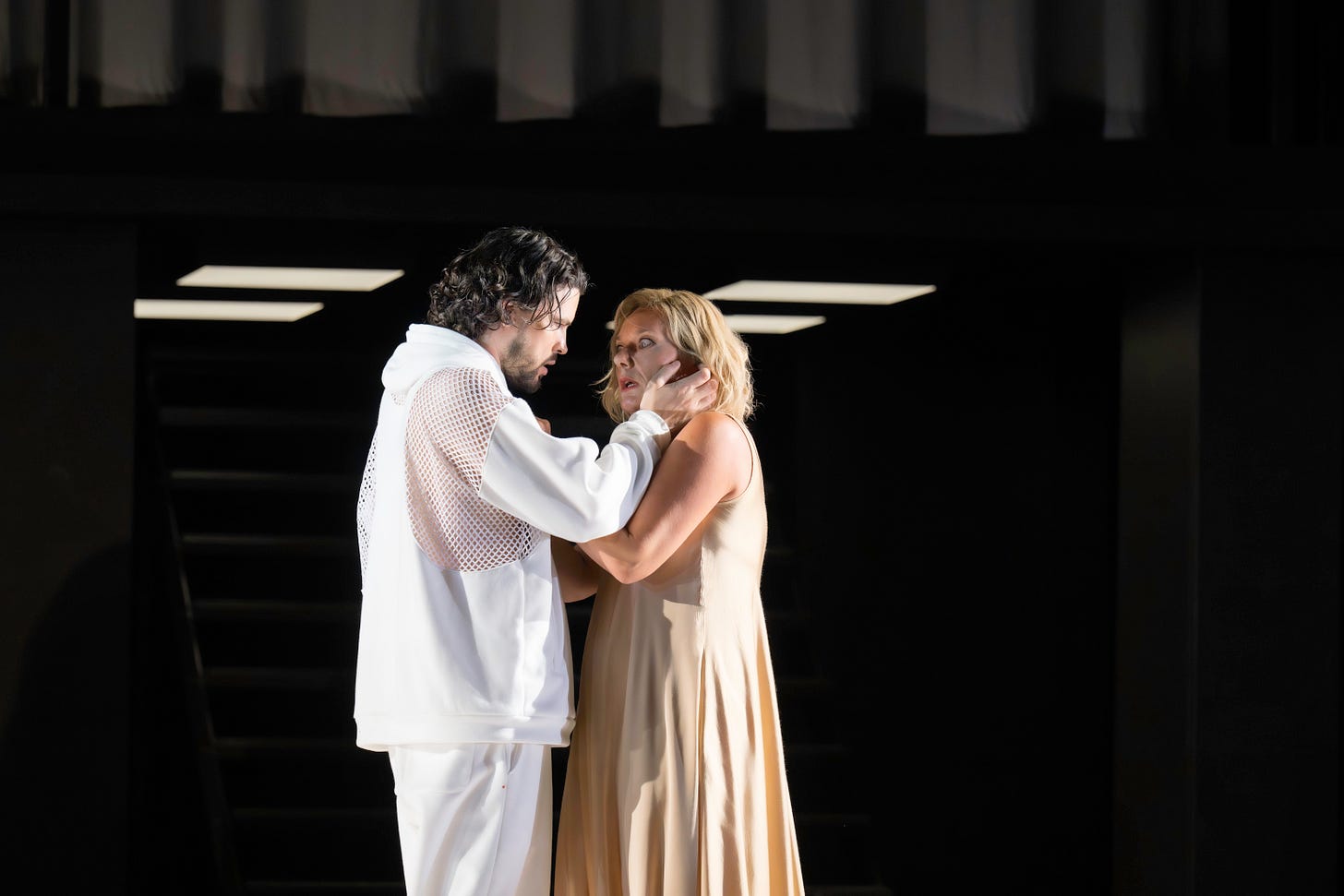Don Giovanni: Young and Old: Andrè Schuen (facing upstage) Clive Bayley (Commendatore, on video) Picture © Monika Rittershaus
This review appeared in Jan Geisbusch’s German translation on Oper! Magazin’s website. It is republished here by kind permission of the editor, Dr. Ulrich Ruhnke
In Act 2 of Robert Icke’s new Don Giovanni for Aix-en-Provence, we see the flawed anti-hero wounded and struggling in the final scene, after being shot by Don Ottavio as he attempts to escape in the Act 1 finale. While not an exact repeat of Claus Guth’s 2008 Salzburg staging (later seen in Amsterdam and Paris), it’s certainly an echo of the German director’s concept. Guth is one of the world’s most experienced makers of opera, whereas the young Brit has just made his debut in opera with the Aix Festival’s signature piece.
It was in 1949, the festival’s second edition, that Mozart’s dramma giocoso put down local roots in the legendary designs of ‘Cassandre’ (Adolphe Jean-Marie Mouron), a production later recorded by Pathé/EMI and repeated for the Mozart bicentenary year in 1956. Six subsequent productions graced the stage of the Théatre de L’Archevêché, notably Peter Brook’s 1998 production conducted by Claudio Abbado and Daniel Harding. This summer’s Don Giovanni, conducted by Simon Rattle, takes place instead at the Grand Théâtre de Provence - the first of several poor decisions that undermined the integrity of Icke’s operatic debut.
La ci darem la mano: Madison Nonoa (Zerlina), Schuen (Giovanni) Picture © Monika Rittershaus
In a programme interview, Rattle claimed to have asked Brook to direct a Don Giovanni conducted by him (the British theatre legend declined, until asked again by Abbado), and confessed to having previously conducted the opera only with period instruments (the Orchestra of the Age of Enlightenment for the 1994 Glyndebourne production). This time his own Bavarian Radio Symphony Orchestra was in the pit - a great concert-giving ensemble, but one that overwhelmed most of the lyric voices chosen by Rattle for Aix.
Andrè Schuen was the exception: his charismatic Giovanni confirmed that the 41-year-old baritone was born to sing Mozart’s anti-hero, a role he first undertook in Montpellier as long ago as 2013 but hasn’t sung widely since. He has the looks and physique du rôle in spades, but even he had to force his voice in Aix’s large theatre. Luckily most of the role - the Serenade being the exception - can take an element of vocal violence to underline the toxic masculinity of the role (according to contemporary interpretations anyway), but Schuen delivered a Lied-like ‘Deh, vieni alla finestra’ of hushed intensity, a whispered sweet nothing in the ear of Donna Elvira’s maid, presented here as an underage girl. This certainly made the scene creepier than usual, but the extra character - uncredited in the programme - was overused as a youthful avatar for both Donna Anna and Donna Elvira (in one scene she shared the latter’s bed, an odd notion indeed).
The director’s conception of the title character as an abuser - the subtitle of Tirso de Molina’s play is rendered in a programme note as ‘The Abuser (El burlador) of Seville’ - was amplified by copious use of video footage (Tal Yarden) of damaged women, some of whom evidently ‘come back for more’ by attending Giovanni’s Act 1 party. The films suggested that Icke had seen too many old Katie Mitchell productions. His use of doubles is by now a Regietheater trope, almost a cliché, but Giovanni’s alter ego here turned out to to be Donna Anna’s father, the Commendatore, first seen in the Overture playing an LP. This older Giovanni stalked the stage during Donna Anna’s arias, and almost became the younger Giovanni at supper: after a brief spin with more LPs, he sang the title role’s lines at the end of the trio and screamed as he was bundled upstairs back to the hospital bed where Don Giovanni’s wounds had been tended by a team of masked nurses. Even more questionable was the director’s use of ‘sound design’ (Mathis Nitschke) to interrupt the music with electronic white noise. It was all a bit of a senseless muddle.
Calmate questa cholera: Schuen (Giovanni) Magdalena Kožena (Donna Elvira) Picture © Monika Rittershaus
The cast may have looked promising on paper, but in this theatre all the singers had to push their voices to be heard above the plush underlay of the BRSO strings and woodwinds. Madison Nonoa was a soubrettish Zerlina: her arias came across with brightly focussed tone but she fared less well in the big ensembles. Pawel Horodyski’s Masetto wielded his voice pugilistically - a credible interpretation of one aspect of the role - but he lacked the character’s sweet, naïve charm. Both of the principal ladies sounded taxed by their arias, Magdalena Kožená especially in Elvira’s ‘Mi tradì’. Mezzo Elviras are rarely a good idea - even the great Christa Ludwig struggled with Klemperer’s slow tempo for her Act 2 scena in his EMI recording - but Kožená, a perpetual Cherubino, sounded out of her depth here, snatching at her top notes and taking breaths in the middle of long phrases. The Czech mezzo may be the prima donna of Rattle’s life, but Elvira is not the prima donna of Don Giovanni, so it was clear favouritism that Rattle gave her the final curtain call (the real prima donna, Donna Anna, having sung the opera’s last aria according to the conventions of Mozart’s time). I have heard Golda Schultz deliver more confident accounts of ‘Non mi dir’ - in concert at the Salzburg Festival, for example, in the ideally proportioned Mozarteum - but this one was still poised, even if the coloratura of the stretta sounded effortful.
Golda Schultz (Donna Anna), Schuen (Giovanni) Picture © Monika Rittershaus
Krzysztof Baczyk’s po-faced Leporello (portrayed as Don Giovanni’s moral conscience, with almost zero opportunities to make anyone laugh) left much to be desired, as he tended to resort to a quasi-Sprechgesang when not actually shouting. Amitai Pati - an alumnus of the Aix Académie - lacked the requisite honeyed tone to make show-stoppers of Don Ottavio’s ‘Dalla sua pace’ and ‘Il mio tesoro’, while Clive Bayley’s Commendatore, a veteran of David McVicar’s 1999 production for Opera North, has certainly seen better days vocally but, as ‘Don Giovanni grown old’ (according to Icke) he was a credible incarnation of the anti-hero’s “fin di chi fa mal!” - the charming young bully transformed into a cantankerous old bruiser.
Cast & Creatives
Don Giovanni - Aix-en-Provence Festival
Don Giovanni Andrè Schuen Donna Anna Golda Schultz Donna Elvira Magdalena Kožená Don Ottavio Amitai Pati Leporello Krzysztof Baczyk Zerlina Madison Nonoa Masetto Pawel Horodyski Commendatore Clive Bayley
Conductor Simon Rattle Chorus Master Aarne Talk Director Robert Icke Sets Hildegard Bechtler Costumes Annemarie Woods Lighting James Farncombe Choreography Ann Yee Video Tal Yarden Sound Design Mathis Nitschke Dramaturgy Klaus Bertisch
Bayerische Rundfunks-Symphonie-Orchester Estonian Philharmonic Chamber Choir
Performance attended July 4, 2025 (First Night)
Further performances: July 12, 14, 15, 18
website: festival-aix.com








Read as one that should be missed apart from the Giovanni. His lied discs are exceptional, nice to know he translates that skill to the stage.
Sounds like a loud evening. Why is there a sound management credit? Are the singers miked?